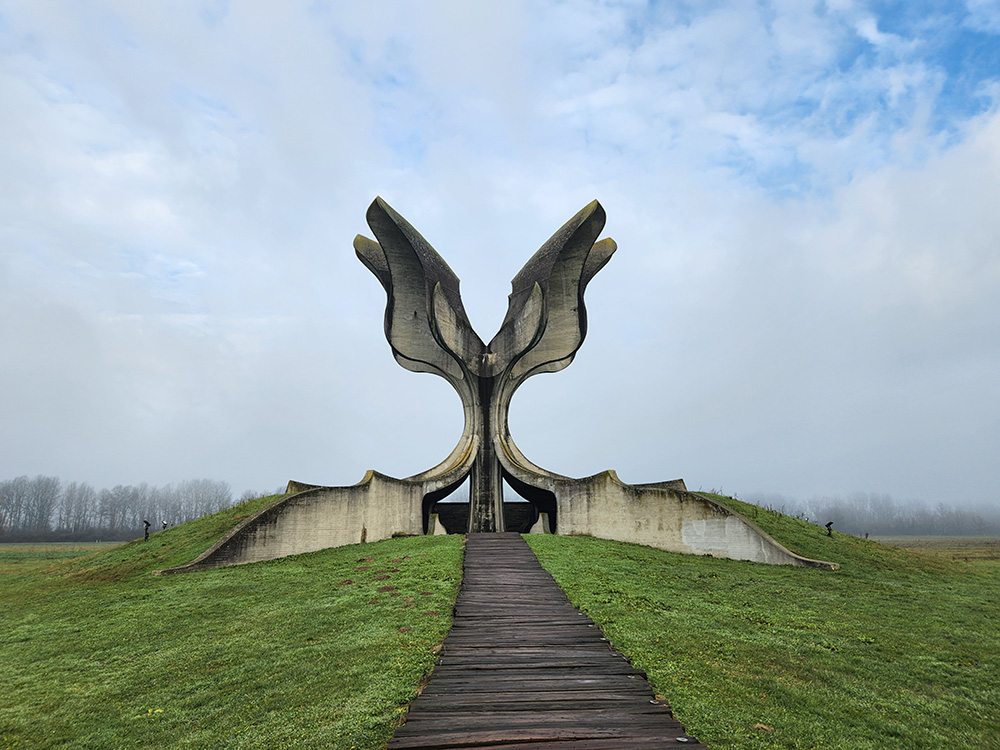
The "Flower Monument," often called the "Stone Flower," is a monument designed by Bogdan Bogdanović and dedicated in 1966 to the memory of the dead at the Jasenovac concentration camp, Jasenovac, Croatia. (GSR photo/Chris Herlinger)
My recent quiet, solitary morning at the Jasenovac concentration camp memorial site, about an hour's drive from the Croatian capital of Zagreb, had all the earmarks of other pilgrimages I have taken in the past two years.
In covering humanitarian fallout from the war in Ukraine (and the shadows of the wars 30 years ago in the former Yugoslavia), I've had the chance, being in Europe, to visit the memorial sites of some of Europe's gravest tragedies: Nazi extermination and concentration camps in Poland, Germany and the Czech Republic; war memorials in Ukraine; sites of human rights violations in Croatia.
Such visits are time for contemplation and remembrance, best done quietly with as few people as possible. At Jasenovac, I indeed had quiet. On the fog-covered Friday morning I visited, I was alone except for the museum staff. I walked the marshy grounds and I read the descriptions about what had transpired at the site — a former concentration and death camp that had been run from 1941 to 1945 by the government that had collaborated with the Nazis.
But though I was alone, I was not really a solitary figure — when you cover sisters, the sisters act as figures of conscience and dialogue, even when they're not with you in person.
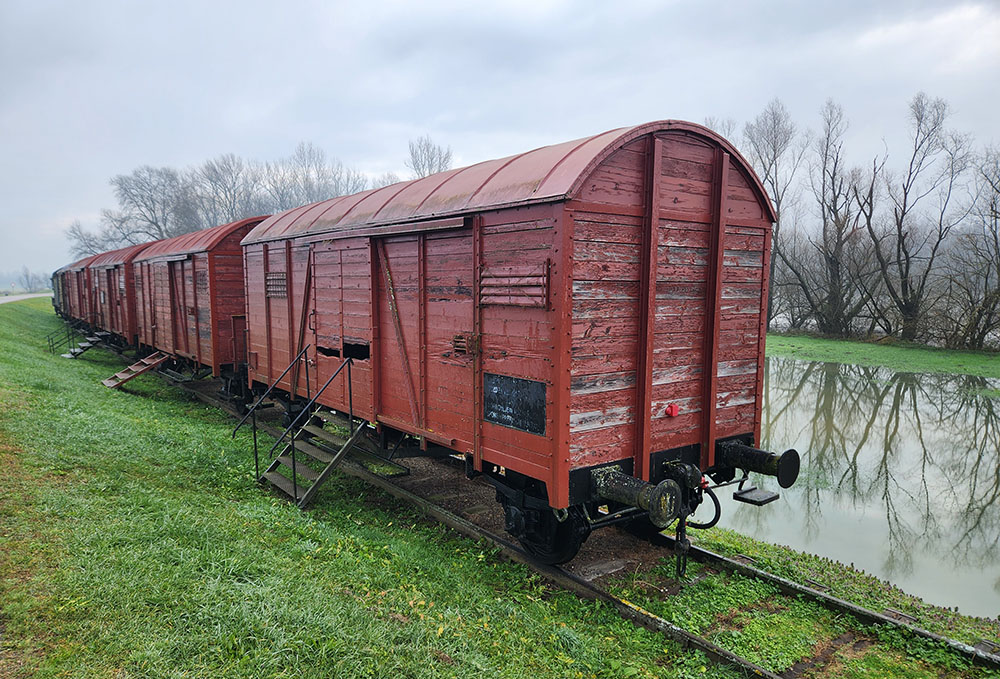
Remains of a train that brought prisoners to the Jasenovac concentration camp, which operated between 1941 and 1945. The train is now part of a display at a memorial site at Jasenovac, Croatia. (GSR photo/Chris Herlinger)
My "inner companion" that morning was Sr. Marija Ana Gašparovsky, a Sister of Mercy of the Holy Cross, whom I had interviewed the day before.
A sister of Slovakian descent born in Serbia, Sister Marija Ana was among a number of sisters ministering in the city of Vukovar, Croatia — the site of a nearly three-month-long siege in 1991, resulting in the deaths of thousands. (A resulting massacre of military personnel included the brother of another member of Sister Marija Ana's congregation, as I noted in an earlier story.)
Sister Marija Ana, now 60, had taken her final vows only four months before the war began, and she remembers that time of impending war as "difficult and stressful" — though from the perspective of spirituality and faith, "a time of richness."
Sister Marija Ana experienced several moments of real danger. One was simply walking down the streets of Vukovar and facing the threat of being shot by the many snipers lying in wait.
Another danger was the constant barrage of grenades launched at the landmark Church of Sts. Philip and James and an adjoining convent where she worked — though even there, Sister Marija Ana always thought in more expansive ways. "I would like to meet the soldier [doing this] and tell him that I forgive him," she recalled thinking. In that hope, she felt "such a love of Jesus."
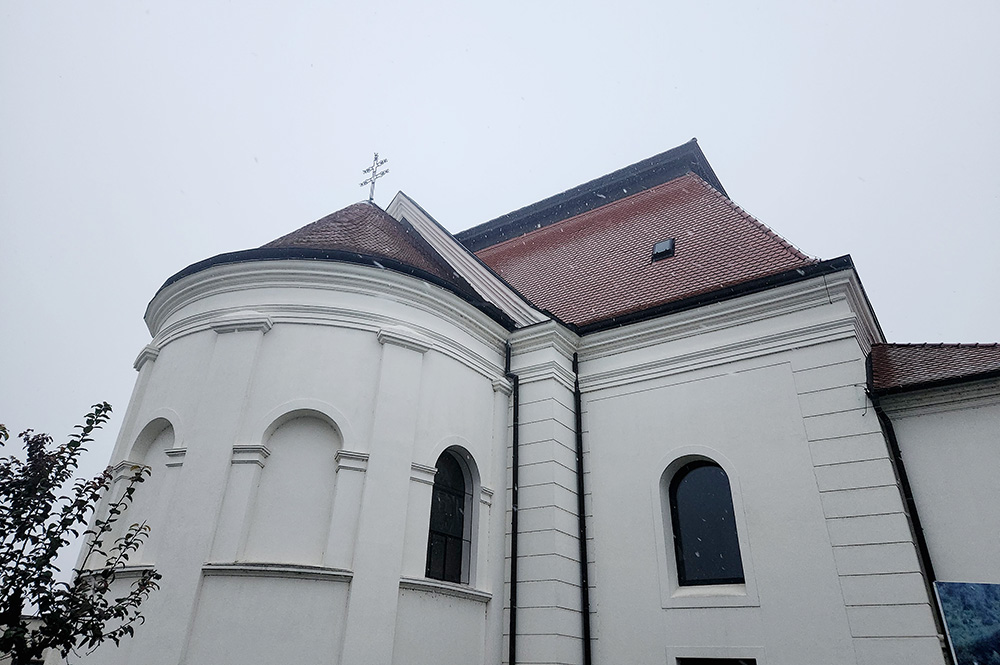
A recent photograph of the Church of Sts. Philip and James, which was destroyed during the 1991 siege of Vukovar, Croatia, but now rebuilt (GSR photo/Chris Herlinger)
Another incident came three weeks later while working in the kitchen of the convent, which overlooks the Danube River and, across the water, Serbia. Bombs from the Serb-led Yugoslav forces came cascading down on the holy site. (Eventually, the structure was destroyed.)
One bomb hit the kitchen area. Sister Marija Ana saw the explosions flash in front of her. "It was dusty," she recalled. "I couldn't breathe."
She added: "It was a miracle I survived."
Soon after that came the fall of Vukovar to Serb-led forces, and with it the capture of Sister Marija Ana and four other sisters and six priests. The religious were taken to a prison camp, Velepromet, which, for all intents and purposes, was a concentration camp.
"I saw people killed in front me," she recalled, also remembering "screaming and cries for help."
Though the camp was a "dirty place, with many wounded people," she recalled, the sudden presence of the sisters and priests "gave people hope."
Advertisement
The Yugoslav Army captors accused their captees of all manner of things — including hating Serbs, which Sister Marija Ana denied, saying she had been born in Serbia. Later, a Serb commander threatened the group, but a Muslim member of the force told the Serb, "Why are you speaking to the sisters that way? You mustn't do that. Leave them alone."
The Muslim soldier turned to Sister Marija Ana and asked that she forgive the Serb soldier for what he had said. Sister Marija Ana said she did, but instantly recognized that the intervention of the Muslim soldier "might have saved our lives."
The two continued their conversation, with the soldier asking why the Croatians had bombed the historic church's bell tower. Sister Marija Ana was taken aback, saying they had not done that and in fact were the ones who had been bombarded.
Then the remarkable happened — the soldier admitted to being among those who had launched grenades on the convent and the church. This was the moment Sister Marija Ana had sought: to meet a soldier intent on destroying the holy sites. "I forgive you," she said.
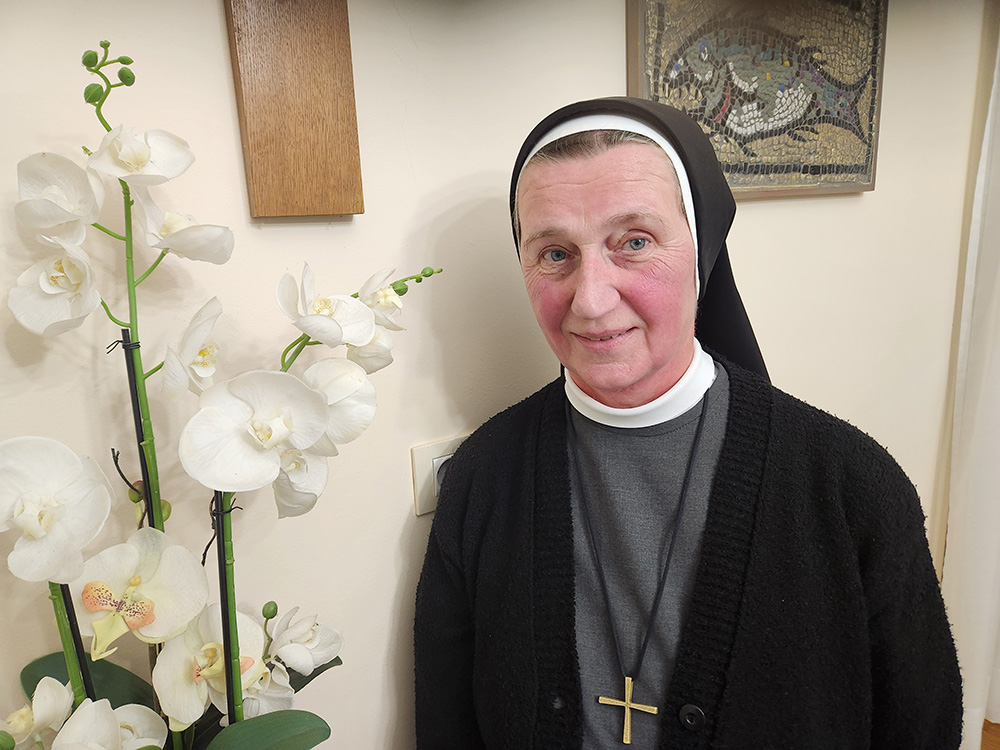
Sr. Marija Ana Gašparovsky, a Sister of Mercy of the Holy Cross, following a recent interview in Zagreb, the capital of Croatia. A sister of Slovakian descent born in Serbia, Sister Marija Ana was among a number of sisters ministering in the city of Vukovar, Croatia — the site of a nearly three-month-long siege in 1991. (GSR photo/Chris Herlinger)
"He felt sorry [for what he had done]," she said, also remembering that he told her, "My God is not your God. I don't believe in your God. But you are young and I see you have dedicated your life to your God. I respect that. I appreciate your dedication. That is something very precious."
The soldier had only two weeks left of his tour, and said he was tired of war and of doing things he didn't like.
He acknowledged that his encounter with Sister Marija Ana left him confused and disoriented. But, he said, he would not forget his meeting the sister. "I will think of you always," he said. "I will never forget this encounter."
In turn, Sister Marija Ana has thought often of that soldier, saying, "To this day, I feel grateful to that Muslim man."
Beyond that singular experience, Sister Marija Ana has thought much of the war, saying she would only speak of her experiences in Vukovar when she felt safe. After leaving the battle-torn city, she said, later encounters with Serbian war veterans revealed regret on their part, saying they had been conscripted because they were poor. Those experiences came during a ministry to Serbia where she worked as a medical assistant and cared for Serbs from all walks of life.
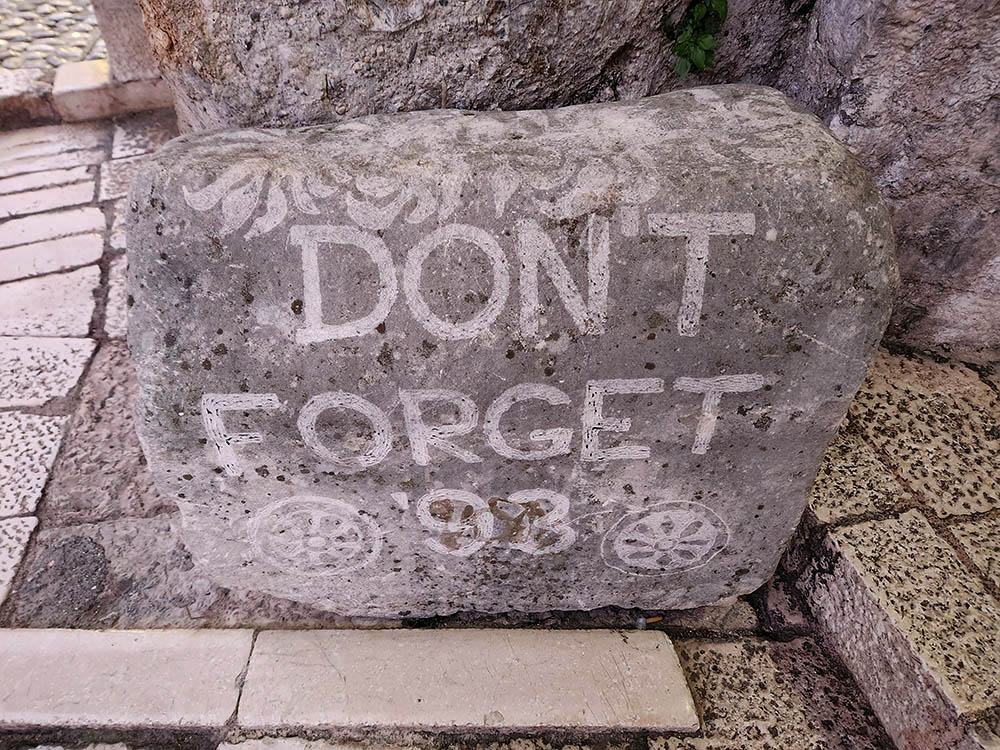
A large rock on the famous Mostar Bridge in the city of Mostar, Bosnia and Herzegovina, is emblazoned with the words: "DON'T FORGET '93" — a call for memorializing and also an alert to the dangers of forgetting the war of the 1990s. (GSR photo/Chris Herlinger)
That came easily to her, being someone who grew up in Serbia and whose parents never expressed hatred toward Serbs.
"When you experience someone who throws a rock at you," Sister Marija Ana told me, "you should give that person bread. I don't want revenge."
The reason those words and Sister Marija Ana's example were so important to me that morning at Jasenovac was because what happened at that camp is an extreme example of the kind of violence that befell the mid-20th century — a tragedy in which people of specific groups were targeted for their religion, ethnicity and political ideas. (Jews, Serbs, Roma, Muslims and Croatian political dissidents were among those detained and killed at the Jasenovac camp.)
We know from the subsequent wars in the former Yugoslavia and now with Russia's nearly two-year brutal invasion of Ukraine that such organized violence can never be dismissed as an impossibility, even in 2024. Wars continue, as do acts of genocide.
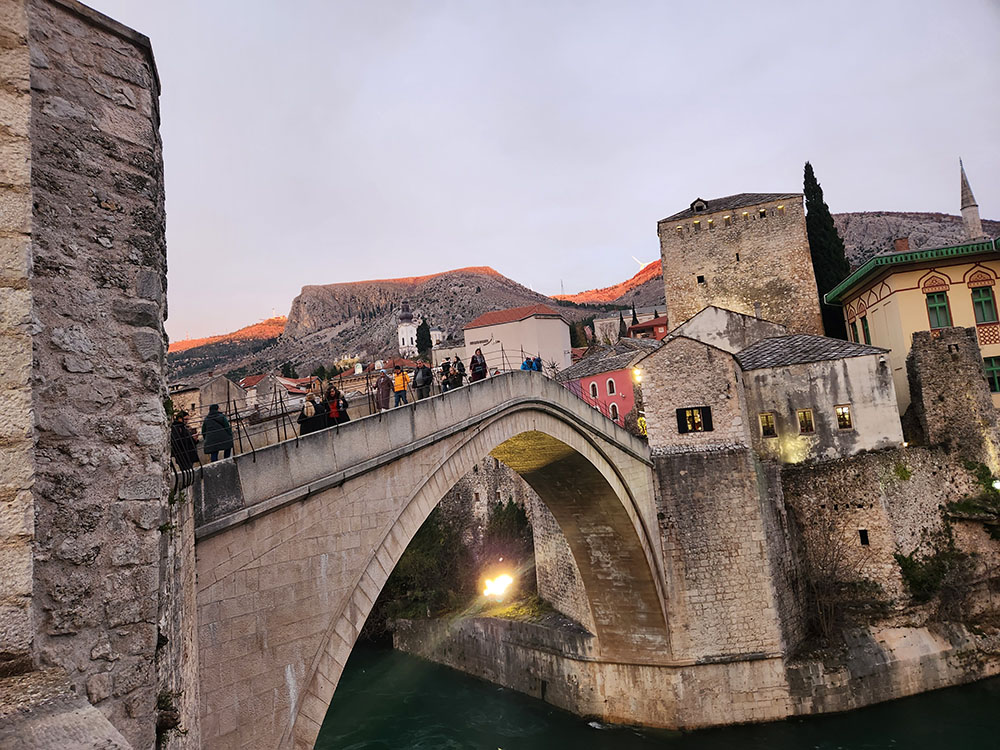
In the city of Mostar, Bosnia and Herzegovina, the famous Mostar Bridge — sometimes called the "Old Bridge" — had been destroyed in 1993 during the war there. It was reconstructed and then dedicated and reopened in 2004. (GSR photo/Chris Herlinger)
Sister Marija Ana knows that — as do other witnesses. And witnessing became tangible in another experience I had during my recent assignment. I visited Mostar in Bosnia and Herzegovina, famous for its "Old Bridge," a Ottoman-era structure that had been destroyed during the war there and linked different parts of the ethnically diverse city.
I had been to Mostar in the early 2000s, and it was not yet possible to cross the bridge — I think it was still being reconstructed at the time. But this year marks 20 years since the bridge was dedicated and reopened — a kind of symbol of rebirth and hope.
It is a steep structure, not easily traversed, and walking across the new cobblestone-laden bridge requires some agility. And as you cross over the bridge's abutment, you see a large rock emblazoned with the words: "DON'T FORGET '93."
That can feel both necessary and cautionary at the same time — a call for memorializing and also an alert to the dangers of forgetting — something that, incidentally, is recognized as the United Nations marked its annual International Day of Commemoration in Memory of the Victims of the Holocaust on Jan. 27. This year's theme focused on the "Extraordinary Courage of Victims and Survivors of the Holocaust."
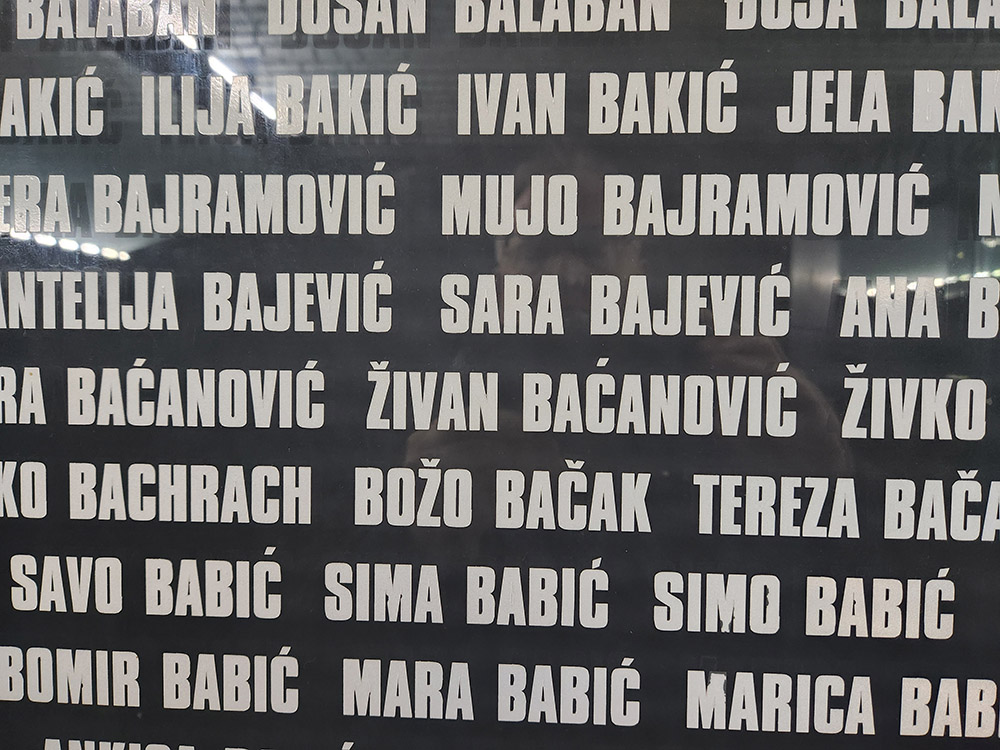
Names of the victims killed at the Jasenovac concentration camp, Jasenovac, Croatia, are memorialized at a museum at the site. (GSR photo/Chris Herlinger)
Though many of their experiences were not directly related to the events of World War II, the sisters I interviewed in Croatia and Bosnia, like Sister Marija Ana, have lived in the shadows of that war and often directly intersected, sometimes at great personal risk, with the events of the later Yugoslav wars. As such, the sisters have embodied physical courage, the need to remember — and the ability to forgive.
As I finished my morning in Jasenovac, the fog fully lifted. It became a sunny morning, a bright ending to my two weeks of travel and perhaps symbolic: I couldn't forget that the sisters I had met believe and act in a generosity of spirit and a sense of biblically mandated forgiveness.
Forgiveness is not easy. It can be difficult. Forgiveness and reconciliation can take time — decades, if not longer. But in order for societies to move forward, they are necessary steps.
"It's in the Gospel to forgive. It's not easy," Sister Marija Ana told me. "But that's exactly why we should all pray for the grace of forgiveness."
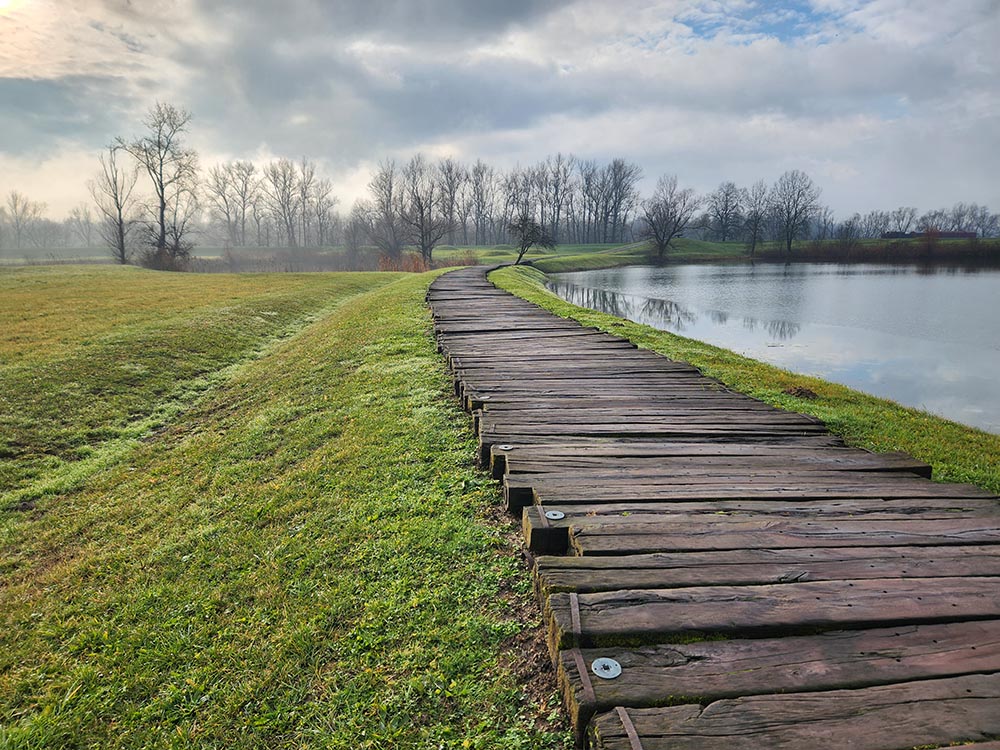
A path to the "Flower Monument" at the Jasenovac concentration camp memorial site, Jasenovac, Croatia (GSR photo/Chris Herlinger)




